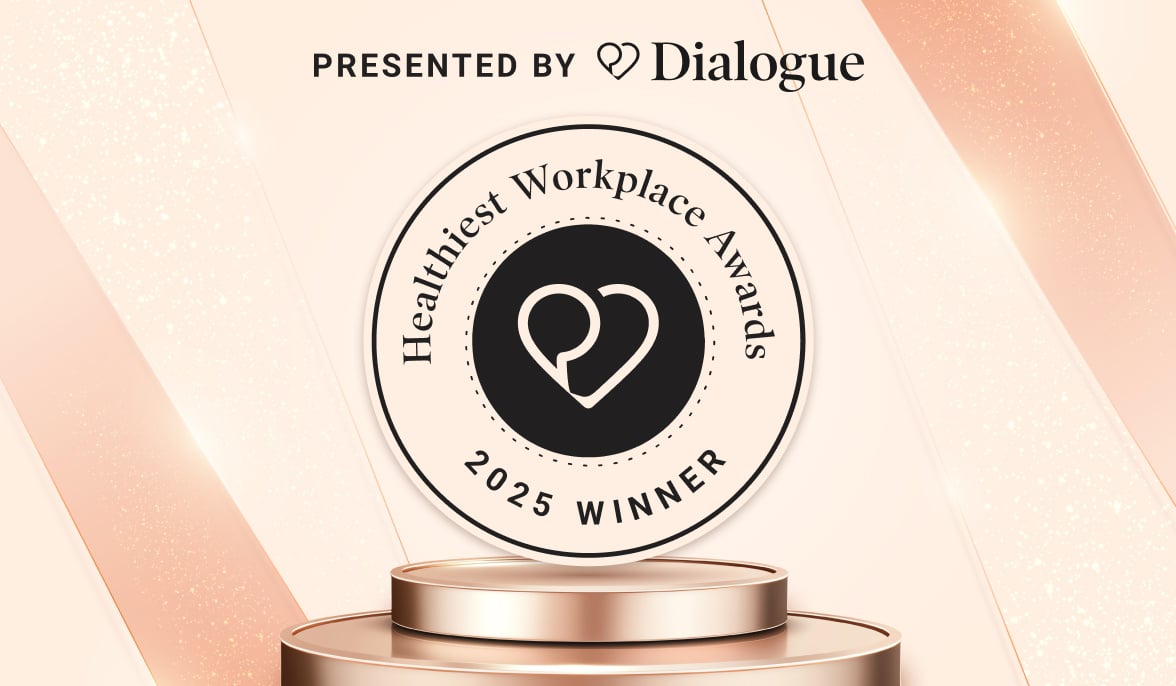All year, we pay close attention to the issues that matter to HR leaders. From women’s health and multigenerational workplaces to personalized benefits and beyond, we meticulously take note of your priorities.
Why? So that we can answer all your burning questions at our annual employee wellness conference! At Sparking Dialogues 2024, thousands of leaders reflected on the power of inclusive and tailored well-being. The event was packed with expert speakers and thought-provoking discussions — leaving us energized with fresh ideas.
Here are some of our favourite insights from this year’s conference.
1. Lead with openness in a multigenerational team
Whether you’re still trying to decode #bratsummer (we’ve been there!) or have mastered the art of being mindful and demure, connecting with younger employees can feel like a steep climb. But according to employer branding consultant Laura Parent, the key is staying open-minded. Leading a team that spans different generations means adapting how you think, talk, and work.
It’s easy to react defensively when someone’s ideas or behaviours don’t match our own — it’s called affinity bias, where we naturally gravitate toward people with interests, backgrounds, and experiences that feel familiar. But by welcoming those differences, you create space for innovation and foster a team environment where everyone feels supported.
Next time a new idea comes your way, don’t be so quick to say no. You might just find a hidden gem!
2. Mentorship is a two-way street
Torys LLP’s Emily Atkinson points out that collaboration, knowledge-sharing, mutual respect, and friendships are the cornerstones of a successful multigenerational workplace. Mentorship plays a key role in fostering these values. While seasoned employees have plenty to offer in terms of teaching and motivating younger team members, mentorship benefits go both ways. Senior employees find renewed purpose, and can even gain new perspectives from the next generation.
Emily also suggests that employers take a thoughtful approach to mentorship. By strategically aligning the skills and knowledge the company wants to nurture with what employees seek in mentorship, everyone—mentors, mentees, and the organization—can benefit.
Watch the full discussion.

3. Return-to-work strategies are critical for women.
While time away from work may seem like the biggest concern for women going through maternity or illness, the transition back to work is just as critical.
The Breast Cancer Foundation’s Karine-Iseult Ippersiel stresses that reintegration into the workplace is riddled with challenges: exhaustion, ongoing treatments, stigma around illness, physical limitations, and more. To fully support women, employers must create space for employees to prioritize their health while also succeeding at work.
Sarika Gundu from BMO adds that it’s not just about policies; it’s about spotting the gaps that leave certain issues unaddressed— like flexible work options, support for pregnancy loss, menopause medication coverage, or robust mental health resources. And perhaps most importantly, employers need to open up conversations around health topics that often stay in the shadows.
Learn more about women’s health at work.

4. Choosing your own therapist may speed up recovery.
Cameron Moore, VP of Product at Dialogue, knows that finding the right therapist can be a huge hurdle for people seeking mental health care. Patients often worry that their provider won’t relate to their experiences or truly understand them. That's why Dialogue is enhancing its mental health services by enabling members to select a provider that fits their specific needs and preferences.
Caroline Guerru from Duchesnay Pharmaceutical Group agrees that removing even one barrier to care can help members feel more comfortable and open to addressing their mental health, which can lead to faster recovery.
Insight’s Barbara Vafopoulos shares a similar perspective as she reflects on her own experience. While Barbara received great care, she initially questioned whether her therapist could relate to her situation. If employers proactively address this bias, she believes more employees would seek support.
Discover more diverse well-being benefits.

5. It's all about meeting employees where they are.
Melissa Reed opens up about how SSENSE supports its team members with an impressive range of tailored initiatives, from paid benefits to innovative engagement strategies.
She stresses that tapping into data to understand employee needs is key. For instance, when SSENSE noticed employees weren’t taking full advantage of their vacation days, they rolled out a wellness challenge to inspire time off. When they spotted a need to enhance women’s health coverage, they expanded their services to include pre-natal testing and broadened birth control options.
So, if you’re not already diving into your well-being provider’s reports, surveying your teams, and analyzing those results, it’s time to get started!
Discover SSENSE’s approach to inclusive well-being.

Keep ahead of employee well-being trends
We’re already gearing up for Sparking Dialogues 2025, but there’s no need to wait for the latest insights. At Dialogue, we’re dedicated to answering your most pressing questions, and we want to keep you informed year-round through our monthly industry newsletter.
By signing up, you’ll stay ahead of the game with valuable insights and HR trends that empower you to support your workforce effectively. Don’t miss out—subscribe today for our newsletter, and your employees will thank you!





 Canada (EN)
Canada (EN)
 Global (EN)
Global (EN)









